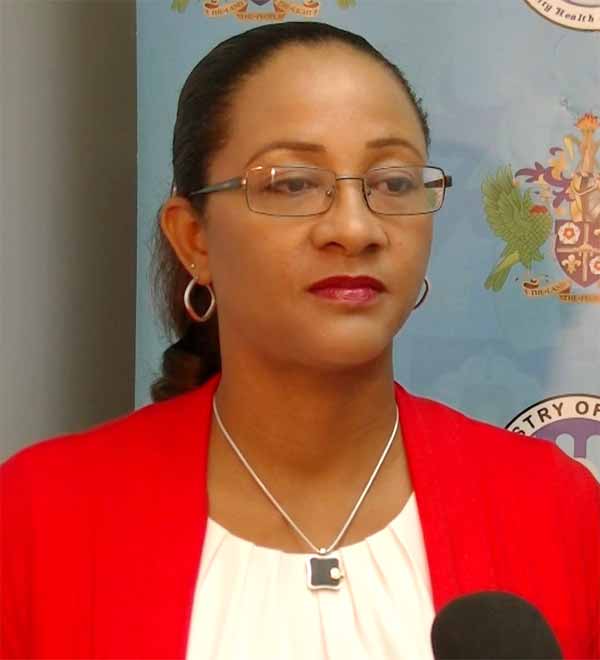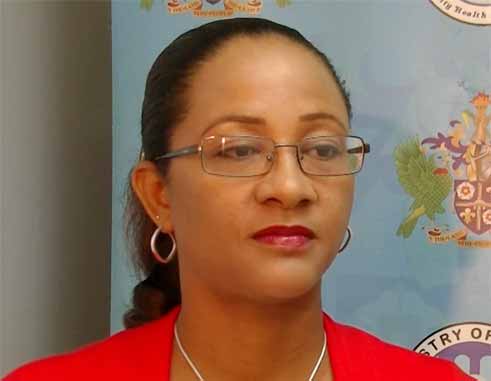Health Ministry Steps Up Awareness.

THE importance of getting early immunization is taking on increased interest as the Ministry of Health currently observes Vaccination Week of the Americas under the theme, “Go for the Gold – Get Vaccinated”.
Currently, Saint Lucia has a vaccination coverage rate for infants beyond the 95% threshold recommended by the Pan-American Health Organization (PAHO). However, that percentage rate decreases for children beyond that age range, ministry officials say.
Some of the reasons attributed to older children and adults not following up on their vaccination schedules include forgetting appointments and the skepticism on some parent’s part about possible side effects of such vaccinations.
With vaccination being deemed a crucial success story throughout the world, this week’s activities aim “to advance equality and also improve access to vaccination for people of all ages,” Assistant Principal Nursing Officer, Juliette Joseph, said at a press conference yesterday
“We also want to increase vaccination coverage for all antigens, to raise awareness of how immunization saves lives, and to keep the topic on the political agenda,” Joseph stated. “We want to ensure that immunization is top priority for our government and also to promote the transition from childhood to family immunization.”
Activities planned for the week include training of health care workers in the importance of vaccination and collaborating with the Ministry of Education to organize working sessions with teachers and the Early Childhood Development Unit.
“We want to increase awareness among our entire population about the importance of immunization. This will be done through handouts and PSAs (public service announcements),” Joseph added.
Medical Officer of Health, Dr. Sharon-Belmar-George, said vaccination has proven to be a successful tool in the primary health care service across the globe, including the elimination of various infectious diseases and eradication of others, including small pox.
She added that vaccination has contributed immensely to the public health environment, for example, in the control of morbidity and mortality, particularly in children. Another benefit is that vaccination is also instrumental in reducing the complications associated with many vaccine-preventable diseases, thus being a cost-effective method.
![Image: Immunization Manager, Julietta Frederick-Cassius. [PHOTO: Stan Bishop]](https://www.thevoiceslu.com/wp-content/uploads/2016/04/Immunization-Manager-Julietta-Frederick-Cassius.jpg)
Dr. Belmar-George said a measles, mumps and rubella (MMR) survey was undertaken last year by the Ministry of Health in collaboration with the Pan-American Health Organization (PAHO) to ascertain the coverage of vaccines on the island. She said the results are now being reviewed and a final document will be released shortly.
Immunization Manager, Julietta Frederick-Cassius, said some changes have been made to the vaccination schedules, due in part to an outbreak of whooping cough (pertussis) between July and December last year.
“So we were giving the whooping cough vaccine at three months,” Frederick-Cassius stated. “Many of the whooping cough cases we were getting were actually infants less than three months old. Because of that, the (health) ministry has taken a policy decision to start giving our whooping cough vaccines much earlier – at two months.”
Frederick-Cassius said the dosage for whooping cough has now increased from four vaccines to five. The change, she added, places Saint Lucia on par with what obtains regionally and internationally.
While measles and rubella have been eradicated from Saint Lucia, Frederick-Cassius said many countries face significant countries. As such, she said, another change had been made: administering the second dose on the MMR vaccine to children aged 19 months instead of between four to five years.
The health ministry has also designated today as National Polio Switch Day as part of the region’s efforts in eradicating polio, a highly contagious viral infection that can lead to paralysis, breathing problems and even death. While Saint Lucia has not recorded a case of polio in over four decades, the island remains at risk due to its tourism industry that can facilitate intra-country transmission.
Frederick-Cassius said an injectable polio vaccine was introduced last year in the first step to improve the fight against polio. As of today, she said, all oral polio vaccines will be withdrawn.
While many people continue to second-guess vaccination for various forms of ailments, Frederick-Cassius said children remain vulnerable to diseases in many parts of the world. Many of these children die, she added, due to limited access to vaccination, eventually dying from those diseases. Since some of the changes went into effect in Saint Lucia last November, she noted, no complaints have been made nor was there an increase in side effects from vaccination.
“So starting vaccination early for us presently is a very positive thing because it means that we are protecting our children much earlier,” Frederick-Cassius said.






![Attendees at the UHC logo and website launch [Photo credit: GOSL]](https://thevoiceslu.com/wp-content/uploads/2026/02/Attendees-at-the-UHC-logo-and-website-launch-380x250.jpg)






![Remnants of an alleged drug boat blown up in a lethal strike by the U.S. military last week surfaced off Canouan on Saturday [Photo credit : St Vincent Times]](https://thevoiceslu.com/wp-content/uploads/2026/02/Remnants-of-an-alleged-drug-boat-blown-up-380x250.jpg)


Dr. Sharon, you’re a very beautiful lady and I think I’m in great health. I just saw
my Dentist for a checkup and she thinks, she hasn’t seen such clean and healthy
teeth. I’m visiting St. Lucia very soon and I’m worried about that Zica Virus. I suppose
with the vaccination season on, can I depend on you for a shot. I know you will say,No.
She said no !!
I told you; they all say no in the beginning.
then tease you with them pretty eyes. I know.